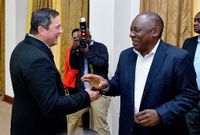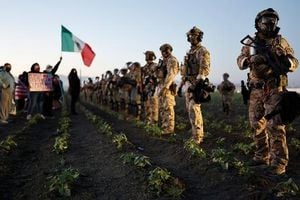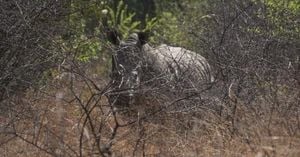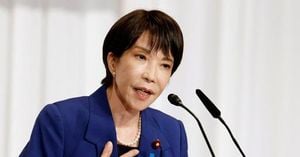The African National Congress (ANC) has narrowly passed the 2025 Budget, securing a vote margin of just 12, amidst rising tensions within the Government of National Unity (GNU). This vote, held on the evening of April 2, 2025, saw the ANC garner 194 votes, while its coalition partner, the Democratic Alliance (DA), along with the uMkhonto weSizwe Party (MKP) and the Economic Freedom Fighters (EFF), managed only 182. The outcome has raised significant questions about the future stability of the GNU, particularly following the DA's decision to vote against the budget.
In the days leading up to the vote, President Cyril Ramaphosa had warned that the DA was at a critical juncture within the coalition. In leaked audio from an ANC caucus meeting, Ramaphosa stated, "The DA must make a decision. They cannot be in government and opposition at the same time," emphasizing that the party could not expect to benefit from a budget it opposed. This sentiment was echoed by Deputy President Paul Mashatile, who asserted that a refusal to support the budget would equate to the DA effectively expelling itself from the GNU.
The DA's decision to oppose the budget has not only put its future in the coalition into question but has also sent shockwaves through the markets. Following the vote, the rand plummeted by 1.62%, losing approximately 30 cents against the dollar, reflecting investor anxiety over the potential fallout from the DA's actions.
Finance Minister Enoch Godongwana reinforced the need for unity, stating, "I don’t think you can vote against a budget, and tomorrow you want to go and be part of its implementation. It can’t be. You’ve got to draw a line at that point." The ANC has not indicated any intention to expel the DA from the GNU, but it has made it clear that parties opposed to the coalition should consider their positions.
Despite the tensions, smaller parties within the GNU, including ActionSA and the Inkatha Freedom Party (IFP), played a crucial role in passing the budget. ActionSA, led by former DA members, has been pivotal in garnering support for the ANC's fiscal proposals. The budget vote, which is seen as a referendum on the GNU's future, has further complicated the relationship between the ANC and the DA, with accusations of the ANC sidestepping the coalition in favor of external support.
DA MP and finance spokesperson Mark Burke criticized the ANC's approach, stating that the party had "crossed a line in the sand," warning that the DA would not enable the "worst parts of the ANC." He indicated that if the party was forced to exit the coalition to uphold its principles, it would do so without hesitation.
In a letter to National Assembly Speaker Thoko Didiza, EFF chief whip Nontando Nolutshungu raised concerns about the procedural integrity of the budget's passage, demanding the withdrawal of the fiscal framework report and a reconvening of the committee to address their objections. Didiza responded by clarifying that the procedures followed were in accordance with Assembly Rules, not solely dictated by the Money Bills and Related Matters Act.
As the political landscape continues to shift, the DA's future in the GNU remains uncertain. The party has indicated it will pursue legal action against the budget's passage, claiming that proper procedures were not followed. DA leader John Steenhuisen stated, "We are in government to hold the ANC accountable, not to rubber-stamp their mismanagement." This legal challenge underscores the deepening rift between the coalition partners.
The implications of this budget vote extend beyond immediate political maneuvering. Analysts suggest that the DA risks alienating its traditional voter base if it continues to oppose the ANC's fiscal policies without asserting clear policy wins. Conversely, should the DA choose to align with the ANC, it may jeopardize its relevance in the eyes of its constituents.
Political observers are closely watching the developments within the GNU. The ANC's ability to maintain a majority, even without the DA, indicates a potential shift in power dynamics within the coalition. However, the symbolic fracture caused by the DA's opposition could have lasting repercussions for the unity project initiated after the 2024 elections.
As the situation unfolds, the ANC remains committed to its budget priorities, which focus on poverty alleviation, infrastructure development, and debt reduction. However, the DA's objections to the budget, citing concerns over spending efficiency and fiscal discipline, highlight the ongoing ideological divide within the coalition.
The upcoming days are likely to be critical as the DA's Federal Executive meets to discuss its next steps. With the potential for a legal battle looming, the future of the GNU hangs in the balance. Will the DA continue to push back against the ANC's budgetary decisions, or will it seek a path toward compromise? Only time will tell.
The political climate in South Africa is fraught with tension as the GNU grapples with its internal conflicts. The outcome of this budget vote may very well set the tone for the future of governance in the country, as parties navigate the complex landscape of coalition politics.




